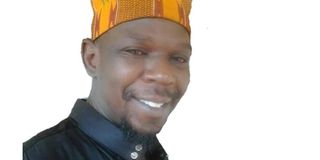Artistes must unite and be involved in National Theatre management

Harry Lwanga is an arts enthusiast
What you need to know:
- The industry’s major challenges started in the 70s and 80s.
- One of the arguments that may be posed is that artistes have been managing the National Theatre and they have done a bad job.
- There were no more Byron Kawadwas and the occasional Alex Mukulu shows were only a flicker of the past glory of theatre in Uganda.
- This is a good opportunity to rise up to the challenge and come together as one.
- It is imperative that they bury the hatchets that artistic egos tend to wield and lament as one!
The fraternity of the arts industry has never been put to test as it has now by many challenges such as the current debate on developing the Uganda National Cultural Centre. It is true that the arts industry has been disorganised and without proper leadership. The possible result of this debate will be one of these two: Artistes will either unite, or will completely disintegrate.
The Ministry of Gender, Labour and Social Development has come up with a plan to build modern structures; to construct two towers in the parking lot of the National Theatre.
Majority of artistes seem to have had no knowledge of the proposed development, until the plan was brought to light by the media and they are rattled. Their problem is that they were not included in the planning of these developments. There are better ways to improve the National Theatre with artistes as partners rather than have the Ministry ‘impose’ these developments on them. In regard to that, artistes are in agreement and united.
But the apparent disorganisation in the leadership of the arts industry is working against them. Where does the actual challenge come from? Why is there disorganisation in the industry and how best can artistes come together and put up a concerted effort?
The industry’s major challenges started in the 70s and 80s. The true spirit of artisanship was corroded. Making money took precedence over quality, expression and consciousness!
The line between business and art was blurred. This affected the operations at the Uganda National Cultural Centre. There were no more Byron Kawadwas and the occasional Alex Mukulu shows were only a flicker of the past glory of theatre in Uganda.
Theatre then became split by class. Most of the drama went downtown. The uptown National Theatre nearly dried up.
Downtown, drama became popular because it was virtually comedy, used only to squeeze laughter and money out of the audiences. Besides, dramatists were also radio personalities hence the popularity.
It is this split that seems to be the basis of the disorganisation in the industry. There are those who, like Phillip Luswata, remained uptown, and those, who like Kato Lubwama, stayed downtown, all of whom care deeply about their trade but see issues from different angles.
However, all is not lost. Artists have several ways in which they can re-organise and this must start by rallying together to save UNCC.
This is the perfect opportunity to rise up to the challenge and come together as one. It is imperative that they bury the hatchets that artistic egos tend to wield and lament as one!
The UNCC must become the source of all leadership of the arts. But to do that, it needs to have artistes taking charge of their affairs instead of civil servants and politicians, because civil servants and politicians have little or no understanding of the decision-making processes of artistes.
One of the arguments that may be posed is that artistes have been managing the National Theatre and they have done a bad job. That is true, however, the process of choosing the director was never one that was left to artistes.
What the National Theatre needs is a director who is an artiste and a manager as well.
The board of directors of the UNCC also needs to have at least half of the members elected from artistes across the board, including painters, writers, crafts artistes, etc. This will create the necessary balances and checks in the national decision-making processes for the industry.
All arts associations should be answerable to UNCC, not independent of it. In that way, successful dialogue can be held with the knowledge that all artistes are well-represented and would eliminate any mistrust.
Another challenge that artistes face is the UNCC Act of Parliament Chapter 50, 8 October, 1959. This Act gives the minister absolute control and power to appoint and make decisions without consent of or interaction with artistes. It also gives the minister a right to make use of and dispose of land and property that belongs to UNCC as he or she deems fit. Essentially, this colonial law puts artistes at a disadvantage against the minister’s proposition. This too ought to be the basis for artistes to unite.
Ultimately, it would be the reviewing of the Act that will put artistess firmly in control of the UNCC. It is, therefore, imperative that once artistes have achieved their goal and the Ministry has relented, the next step would be to petition Parliament to review that law and put them firmly in control of their national destiny.
Mr Lwanga is an arts enthusiast.




